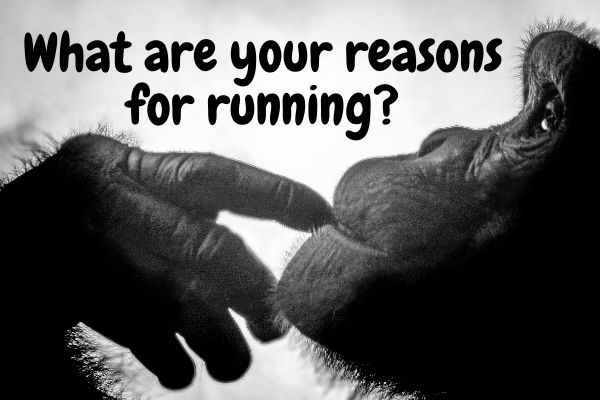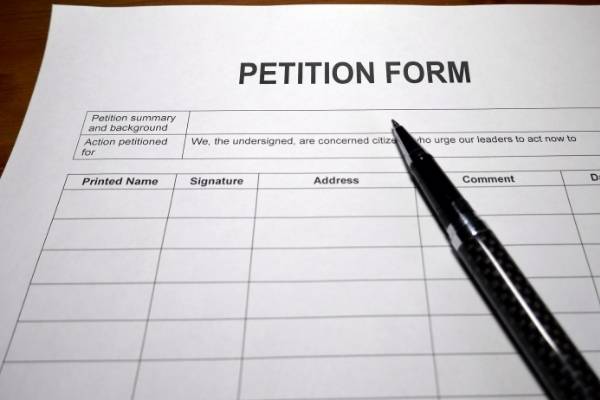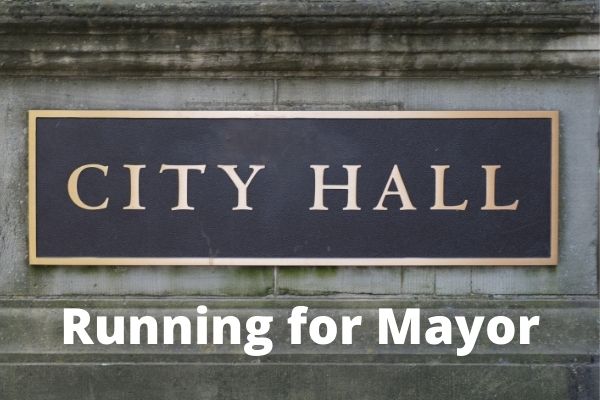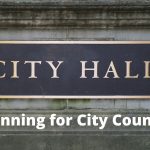Most people associate a mayoral position with a large city. However, the position of mayor as the head of a municipality extends to small towns and villages.
The majority of mayors and the city council, village, or town council are directly elected by the voters. This means you’ll need to run a more traditional political campaign.
Let’s start with the basics.
- What type of government does your city / town / village fall under?
- Why do you want to become mayor?
- Check your eligibility to be on the ballot
- Can you keep your existing elected position?
- How much money will you need raise for your mayoral race?
- Increase your local popularity
- Build your endorsements
- Expand your social network
- Attend events and government meetings
- Create a campaign committee
- File your documents
If you want to run for mayor, there are a number of factors that you need to take into consideration. You should be aware of the eligibility requirements, the most pressing issues that are affecting the city, and how to go about raising funds for your campaign. Also essential will be identifying an effective campaign team to help plan and execute a successful campaign strategy.
What type of government does your city / town / village fall under?
Your local government will not only determine the eligibility requirements, but also the duties and responsibilities of mayor.
Did you know there are two types of mayors? They can ‘weak’ or ‘strong’.
A “Strong Mayor” is elected directly by voters. Under this form of local government, the mayor serves as Chief Executive to administer government duties. These duties include the power to: propose annual budgets; draft and implement administrative rules; and appoint and remove department leadership.
These types of mayors typically serve in a “mayor-council” system of government. This consists of an executive branch (Mayor) and legislative branch (City Council). Some mayors have veto power over council legislation, while others do not.
A “Weak Mayor” may also be referred to as “council-manager”. Under this type of government, the elected council ( often a “City Commission” or “Board of Aldermen”) makes policy and sets the local budget. The mayor is a full voting member but has little or no executive power. In these cases, the mayor is simply appointed by the council, or it is a ceremonial role that may be rotated between council members.
To administer city policies and programs, a professional City Manager who is responsible for managing city employees and overseeing the day-to-day operations of the government.
“When the burdens of the presidency seem unusually heavy, I always remind myself it could be worse. I could be a mayor.” – Lyndon B. Johnson
Either way, becoming elected is not easy. You must adhere to the requirements of a candidate and abide by state and local campaign laws and regulations.
These regulations include:
- How you can run for office.
- How and when you can raise money.
- How campaign contributions can be spent.
- Messaging requirements
- Everything in between.
Finally, becoming elected mayor requires convincing the majority of residents to vote for you.
This process can be overwhelming if this is your first election, but you will find the process easier by starting with the basics.
Why do you want to run for mayor?
Before you start a campaign for mayor, you should have clear goals in mind. What are some of the challenges facing the residents in your town or city? What policies would you enact to help them deal with those issues? What makes you a better choice than your political opponents?
The National League of Cities releases an annual State of the Cities report. In it, the NLC examined 100 State of the City speeches from large and small cities across the United States.
According to the report, these are the top issues that matter to cities:
- Economic Development
- Public Safety
- Budgets
- Infrastructure
- Education
- Housing
- Energy/Environment
- Demographics, Diversity, and Inclusiveness
- Technology and Data
- Health Care
There is a good chance that one or more of these issues can become the basis of your candidacy. Learn the local issues and how they effect taxpayers and residents. Find out what solutions are being proposed and think about your stand on those positions.
Did you know? There are aver 1,400 mayors responsible for representing cities with populations over 30,000 across the United States.

Your objectives will affect the messaging and theme of your campaign. You will need to understand both the issues, your districts, and your voters to develop a campaign platform. Analyze the attitude of the locals towards the current elected officials.
Analyze the demographics of the area, including the number of voters, age ranges, household income and more. What are the dominant constituent groups in the city? What are their needs and demands?
Research previous campaigns. How did those candidates conduct their campaigns? What issues did they run on? What success have they achieved?
With this information, you can start to design a robust campaign strategy.
Check your eligibility to be on the ballot
The eligibility for a mayor position varies based on the town you intend to run. Before you begin your campaign, you should be familiar with the eligibility requirements.
Below are some of the common requirements for mayoral candidates:
Age requirements
Generally, to become mayor of a large US city, a person needs to be at least 18 years of age. Other places have their own specific age requirements. For example, Hialeah, FL requires a candidate to be at least 19 years old, be a registered voter and a local resident for at least one year.
You must be at least 21 to run for mayor in Louisville (KY), Aurora (CO) and Oklahoma City. Cities like Colorado Springs, Washington, Glendale and Kansas City requires you to be 25 years. Denver (CO), Nashville (TN) and Memphis (TN) requires candidates to be at least 30 years of age.
A few cities don’t have a minimum age at all. They include Baton Rouge, LA, Pittsburgh PA; Minneapolis MN; and Jersey City, NJ.
Educational requirements
Most cities require you to have at least a high school diploma to be mayor, while others need a bachelor’s degree.
Residency requirements
Most cities require that candidates should be residents of the city or town for at least one year before they apply for the position. Also, if the candidate wins the election, he/she should live in the city until the end of their tenure as mayor.
If you don’t think you qualify to be mayor, perhaps running for city council would be a better move. That could give you additional experience an connections.
Where to get help on starting your campaign
Your county elections board or city clerk can provide the requirements and rules for your election before you run.
As with anything else government related, paperwork is everything. You will need to get and fill out all the relevant registration forms and documentation. You must provide details such as your name, age, education experience, residence, and your financial interests.
You will have deadlines for submitting the documents. Some documents may have filing fees.
Know your deadlines. Don’t miss them.
Can you keep your existing elected position?
Some cities require the candidates to resign from their existing elected position while serving as mayor. This is called “resign to law”. Five states currently have resign-to-run laws—Arizona, Florida, Georgia, Hawaii, and Texas. If you fall under this law, you will need to leave your current job before you can run for another office.
“What matters is voting for where you live: Who’s your mayor, who’s your police chief, who represents you, your city council, your judges. That matters that you vote.” – Joe Walsh

How much money will you need raise for your mayoral race?
Election costs vary from location to location and from position to position. A village mayor candidate may hardly need to raise money at all and do little more than door-to-door canvassing.
However, a large city campaign will require considerably more resources and networks to establish itself.
- Before you plan for fundraising, you should calculate the amount needed for your election. Election costs are higher than ever before. The amount varies based on the size of the city and competitiveness of the seat. The state board elections have financial campaign disclosures, but it’s also wise to check the FEC records for estimations if you live in a large city.
- Many factors can affect the costs of a campaign. For example, if you are running against an entrenched incumbent, then you will likely need a bigger budget. Research the amount raised and spent from other mayoral candidates from the last few campaigns. Figure that you will need to raise and spend within that range.
After you evaluate the past elections, you will identify the spending trends that will help you develop a practical budget for your own campaign.
Early donors who believe in your cause will be some of your most important backers. Online fundraising is one of the most effective ways to find money when starting out. You should have a mayor campaign website as early as you can to accept donations from online donors.
To start fundraising, you won’t need much. Once you have a bank account and website, you’ll need a payment processor for your online transactions. A good online donation page contains the logo and colors of your campaign. A short introductory candidate video is also a good addition.
Related: Start your mayor campaign website – affordable package pricing and resources.
Increase your local popularity
Good messaging bonds you with voters. But to really build a following, don’t underestimate the power of raw popularity.
Many voters will vote for a popular individual for any political seat. We often see this in governor elections, where celebrities with no political experience sweep into office.
So, how do you increase your popularity?
It can be tough, especially if you are not extremely outgoing.
- Familiarize yourself with what is happening locally through community events, charity events and more.
- Engage yourself in development initiatives and become a regular visitor at council meetings. It is there that you can display leadership in the issues that are important to you. Others who attend those functions will get more acquainted with you and identify you as a potential leader.
- Try to meet with community influencers and other essential people outside of scheduled government meetings.
- If you get the support of elected officials and community leaders, that will eventually give you the connections and endorsements needed to boost your candidacy.
Make sure you start your outreach process before you declare your intention to run for any political seat. Once it’s known that you are vying for an elected position, many will treat you differently.
Later, once you get your campaign off the ground, you can erect billboards, door signs and brochures to make yourself more visible to the public. Door to door canvassing across different neighborhoods will also enable you to establish a deeper connection with the voters and get better support. Online campaigning will help you reach new voters and keep in contact with existing supporters.
“Mayors are leaders, doers. We get things done, and we are moving America’s cities forward.” – Michael Nutter
Build your endorsements
Getting endorsed by politicians, political parties and other authorities can help establish trust with a good segment of the electorate. Organizations don’t seek candidates to endorse, so you should be proactive when looking for endorsements. This is especially important for first-timers.
Most organizations require candidates to follow a certain process to secure their endorsement. Typically, you will need to fill a questionnaire and outline your policies that will bring that will benefit the organization or their objectives. And if you need endorsements from individuals, then a letter with a similar outline will be beneficial.

Some ways to raise awareness in your region are to have local, well-known citizens write letters in the local newspapers or ask for endorsements from editorial boards.
It helps to be endorsed from other politicians, political parties, influential locals, local unions and community leaders. These are essential to your campaign as they raise your profile while making you more visible to the voting public.
Good endorsements can also boost your fundraising and volunteer organizational abilities.
Expand your social network
As a politician, you need to be active on social media. If you are not talking about yourself and managing your own online conversation, then others will speak for you.
And that will probably be your opponents!
Learn how social media works yourself. Eventually, your campaign team will help put together a social media strategy. Work on promoting good messaging and content. While you may do most of this yourself before you announce your candidacy, eventually you may want to have a social media manager handle this aspect of the campaign.
Running for office? Get free tips for starting and running our digital campaign. Sign up here.
Attend events and government meetings
As an aspiring politician, it is crucial to participate in events and government meetings. They offer a platform to air your views on local issues and get recognized as a leader with genuine concerns for the people.
As noted above, being present in public meetings you will provide opportunities for meeting local representatives and developing a network that will be vital before and after your campaign.
Building contacts now will be essential to your political career.
Meet community members
Every day, you should have a goal of meeting at least one influential people in the community. These are individuals who understand the local community. They can help with your messaging and especially in convincing voters in their districts.
Relationships are the ingredients to success in almost every industry and profession. A larger network means a higher potential for success. Therefore, you should dedicate time for networking activity.
Create a campaign committee
Before you run, you will need to establish a campaign committee, designate a campaign treasurer, and have a campaign bank account.
These requirements are typical for every political campaign. A treasurer must be appointed before the making of expenditures or accepting of any funds towards the campaign. A candidate can act as their own committee treasurer though this is not recommended.
The treasurer is responsible for:
- Signing and filing of committee reports and statements
- Budgeting for expenditures
- Ensuring the campaign contributions fall within legal limits
- Authorization of expenditures
This position is sensitive and comes with significant responsibilities, and so you must have a trusted individual for the job. The treasurer should develop a campaign budget that includes sources of money and expenditures for the entire campaign period.
Other important members of your campaign team are:
- Chairperson
- Communications director
- Campaign manager
Most cities require you to establish a committee before you declare candidacy. Once established, your team will also help in day to day running of the campaign.
File your documents
Many cities require mayor candidates to get a certain number of signatures for an election petition for them to qualify to run for the seat. So, you will need to collect signatures if you want to be on the ballot.
The exact number of signatures will vary based on the size of the town or city and the number of residents. These forms are available at your local clerk’s office and specifies the number of signatures needed and the deadline of collection. If you are running for mayor in a large city, then you may need a team of canvassers and volunteers who will help you to get the signatures.
Once your petition has collected the required number of signatures, the next task is the candidate’s affidavit and fulfilling any other election requirements.
If all goes well, you will be on the ballot!
And that’s just the start of your election season. As you ramp up your campaign, building an excited base is important. You will need those people to show up on Election Day.
“Winning the election is a good-news, bad-news kind of thing. Okay, now you’re the mayor. The bad news is, now you’re the mayor.” – Clint Eastwood

Turnout is crucial in mayoral elections, as in 15 of the 30 most populous cities in the U.S., voter turnout is less than 20 percent.
Now that you have an idea of how to become a mayor, now is the time to get started!
Featuring an affordable political website builder, tools and marketing services, start your campaign with Online Candidate.
Related: Start a Campaign to Run for City Council
« Preparing Your Campaign For Early VotingEvery Vote Counts – Video »
Tags: mayor








